-----------Non-Fiction----------
Carmageddon by Daniel Knowles: Cars are evil. And sometimes so are their drivers. That's one conclusion that can be made from this book. Knowles has tons of thoughts on how cars have messed up civilization, and how much damage they are causing to the environment. He shows how car manufacturers have practically brainwashed people into thinking they can't leave home unless they are driving a car. He insists citizens have been brainwashed into thinking that ALL transportation tax dollars should go to cars and to heck with those pesky bikes and pedestrians. They don't pay transportation taxes! We know that actually, they do. And besides, Transportation is not about moving cars, it's about moving people, says me. You can see I'm partly on the author's bandwagon. (And by the way, I once made that statement at a county public meeting concerning local transportation).
Remember the 60s song, "They take paradise and put up a parking lot . . .?" Well, "they" do. When I drive past the now-defunct Sears & Roebuck in Riverside CA, golly, it has Costco beat for a mega-parking lot. The author contends that we have made parking too easy, and it shouldn't be free. "If" a driver had to pay for parking--well, actually they do. Yes, the cost of each parking place is being borne by businesses and apartment owners who are required by cities to have certain numbers of parking spaces. But surprise, the driver is paying in the form of higher rents and retail prices. But if a driver had to directly pay for parking, he/she might be more inclined to take the bus or train. I know when I arrive in downtown PDX on the train, it's a thrill to step off directly into the city, not having spent 20 minutes looking for a parking spot, and not having paid 8 or 10 bucks for the privilege.
Author reviews the history of the automobile. It was once a toy only for the rich, and they wrote the rules. From then on cities, roads, etc. were all built around the car, rather than in a way to benefit actual humans and their neighborhoods. If you have ever had the experience "you can't get there from here," or, "you can get there from here but will have to go far out of your way to do it," then you know what I mean. Perhaps you have seen entire neighborhoods gutted because it was the best route for the new highway. I have--as a child I remember the houses pulled down or moved elsewhere in order for the Hollywood Freeway to go through. Near my current house, in about 1980 Murray Road was widened from a homey 2-lane road to a 5-lane mega-road. Homeowners on both sides begged the state to raze their side of Murray, because they didn't want to be the ones left living on a wide, fast-moving road (the west side lost the battle). The neighborhood was decimated.
I have seen parents who live a block from the school load up their kids, drive them to school, and then drive back home. I have heard drivers rage about the curse of pedestrians and bicyclists, conveying the message that we should all be curled up in fetal position unless we're in a car. I once suggested to some relatives of mine that it's too bad we're not more like Europe, as far as not being afraid to bike and walk places. You would have thought I was going to repo all their cars and take them straight to the crusher. They were violently opposed to this terrible idea of biking and walking. Sheesh. (These are southern California folks, where cars rule and bikes have no place).
The author is pointing out a better way of life, and the book is well worth reading. He knows cars are not going to go away, and he has suggestions on how we can reduce our dependency.
Bad Bridget***by Farrell & McCormick: Wow, have I ever been naive. My Irish ancestors were so straight-laced that it's hard to even find information about them. If they had led a life of crime like the women portrayed in this book, I would have by now fleshed out their personalities, known about all their relations, and could have visited the prisons they spent theirs years in. I just assumed that all Irish women were meek and law-abiding, like my own 'under-the-radar' ancestors.I had no idea that at least in certain places, Irish women were as criminal as the Anglos who despised them. Assaults, murders, thievery etc. were familiar to many. So what motivated a good Catholic Bridget to cross the pond and transform into a ne'er-do-well? I would love to say it was desperation in the form of starvation, to feed their children, to allay financial struggles. For the most part it was none of the above. For some it was being trapped in a bad marriage. Others were attracted to life on the edge, just as happens now.
Brattleboro Vermont was home to many Irish immigrants who began arriving in the 1840s to work on the railroad or in factories there. In all of my research which has included vital records of every type, court records, property and wills, intense study of newspapers, etc. I have seen very very little crime related to Irish women. There was Mrs. Dundon on the Vernon Road who, as newspapers describe it, held "orgies" at her home. In reality it appears that she simply over-indulged in drink and invited friends over to over-indulge with her. That is about the worst I have seen pertaining to these immigrant Bridgets. Oh, also Mrs. Long who had a running feud with some of her neighbors, but feuds don't thrust one into prison.
Oath and Honor**** by Liz Cheney: Here, Ms. Cheney has done her darndest to dissuade Americans from voting for Donald Trump in 2024. This is an important book. As y'all know she was part of the January 6th committee which meticulously examined thousands of sources over many months time, to uncover the truth of what happened on that January day in 2021. She has laid out, in a meaningful way, the case for not allowing him anywhere near the White House this coming fall, because that would legitimize his anti-Democracy actions, and even his law-breaking. And it would provide a path for him to once again, be the bull-in-the-china shop, a role he relishes. It's also a role relished by his base, who seem not to comprehend the long-term ramifications of throwing away what has made this country successful for almost 250 years. Must read. With an open mind, of course.
Emperor of Rome*** 1/2 by Mary Beard: If you have been waiting at the edge of your seat for a book to educate you on the phenomenon of Roman emperors, wait no longer. It's really quite a fascinating topic. We know the Hollywood depiction of Roman emperors dressed in their battle skirts and armor w/ arm braces and golden, plumed helmets. But really, no emperor walked around that way, and further, most of them hardly ever fought in battle. Many didn't last long enough to find all the good restaurants in Rome, let alone govern the empire. Beard does not go in chronological order, citing each emperors plusses and minuses and wars etc.. She addresses the reigns of emperors using more of a topical approach. We learn how they dressed, what they ate, how they governed, how the commoners reacted to the emperor's actions. It's super interesting, and next time you watch a Hollywood movie depicting a Roman Emperor, you'll know the true story.
Romney: A Reckoning***** by McKay Coppins: a must-read book! I loved it. I loved it not just because I have always admired Romney for speaking truth, striving to do what's best for the country--country over party--and bold enough to speak unpopular opinions. Some in Congress won't speak out, or even speak the truth, because that would impede their reelection. Never mind what's best for the American citizens they were elected to serve.
The best part about the book is that the author had access to Romney's journals and some of his papers. He boldly expressed his thoughts and now they are there for all to see. It's unfortunate that because he is who he is, he could not be reelected to the Senate in 2024 because of the Trump faction in Utah. They are going to lose a morally upright person and get a more run-of-the-mill, or worse, Trump-worshipping politician in Romney's place.
A Day in the Life of Abed Salama*** 1/2 by Nathan Thrall: The lives of Palestinians living in the West Bank are anything but simple, anything but easy. This book follows a Palestinian man whose child cannot be located after a bus accident. The red tape, the disrespect, the frustration and pain, it's a way of life for them.
Vengeance Is Mine****1/2 by Richard Turley and Barbara Jones Brown: This follows the book by Turley and others, Massacre at Mountain Meadows, about the killing of 100+ members of an Arkansas wagon train in southern Utah, 1857. After the event, coverups by participants and church leaders created an atmosphere of suspicion and terror, and it got to be that people mostly shut up about it. It wasn't for many years that some of the perps were brought to justice. Only one, John D. Lee, was executed, and that was 20 years after the event.
A friend of mine, who was born and raised in that area, told me that the reason her last name is L-e-i-g-h instead of L-e-e (identical pronunciation), is that the spelling was changed to distance the family from the above-mentioned perp. A story in her family says that the men in her family spent the time coinciding with the massacre, up in the mountains, in order to make sure they were above suspicion. In other words, they either knew, or at least had an inkling, about what was to happen. This is an unproven family story.
Read both books to get the full picture of the terrible thing that happened to innocent pioneers. That will give you context about why it occurred. No excuses though.
The Angel Makers*** 1/2 by Patti McCracken: The village of Nagyrev, Hungary, is the setting for this story of a mid-wife who made it her work to decide which men in the village lived or died. She flew under the radar for a while, but eventually the village whisperers made her actions known. Of course it's always wrong to take someone's life, but it's hard to feel sorry for a horrible man that beats his wife every day, and then keels over and dies of a "heart attack," which was actually poison supplied by the mid-wife.

The Decadent Society*** by Ross Douthat: 'Stagnation in society plagues our world' is the general idea here. But I don't know--doesn't every generation think the world is going to the dogs? Every generation thinks, "what is the world coming to?" Maybe we reach new lows as time marches on, but when would we rather live? During a time when death kept us company, when retirement was unheard of, or when you couldn't visit family because they lived a 6-month wagon ride away? Well, this isn't really a book review; the book was ok and Douthat is a well-known writer, so.
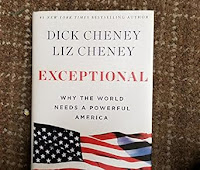
Exceptional**** by Dick & Liz Cheney: The focus of the book is what some see as a disastrous Obama presidency. The book begins with a rah-rah tone, outlining the US's birth and progression, and our principles and marvelous documents. Though it's becoming more popular to dis our own country because it's imperfect, I am not ashamed to point to it as an amazing standard for the world (because, would you rather live in Sudan, or China, or Mexico, etc.?). The Cheneys are also not ashamed to point this out. I liked the book.
Washington: A Life***** by Ron Chernow, second reading: Extremely well-researched and written, Washington gives us the ups and downs, the successes and failures, the flaws and virtues of this unusual man. He was the right person in the right place at the right time--I don't believe in coincidences. Chernow has a way of writing that makes you feel you're in the room when events are occurring.
The audio version is 42 hours long; the physical book is a brick. But no matter how long it takes, the book is worth every second you put into it.
Incidentally, my father was born and raised on land in Pennsylvania that was once owned by GW. GW bought the land, some of the finest he had ever seen, about 1770. He had a mill constructed on the land, and had an idea for the layout of a town, a town that was not officially brought into being until several decades after Washington's death. That mill was rebuilt in the 90s and is open for browsing and tours, in Perryopolis PA. My Dad was once a tour guide there!
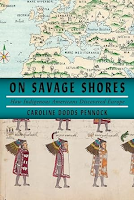
On Savage Shores by Caroline Dodds Pennock: DNF--I suspect this book is informative and interesting, but after listening to 10% I still wasn't into it and gave up. It relates the experiences of natives from the American continent who were taken to Europe beginning in the 1500s. One thing that turned me off is that the first part of the book focuses on how bad white Europeans were to the natives (true), how they stole their gold, forced them into slavery, and so on (all true). But I wasn't there, yet the narrative insinuated that it's all my fault, just by virtue of being a white European. Perhaps that isn't the author's intention, but it felt like it. She even got into how we mispronounce Montezuma's name, and even spell it wrong. I'm guilty as charged because I haven't put forth effort to unlearn what I learned in grade school, especially when it concerns a person who has been deceased for 500 years. In the next life, maybe.

2020 ***1/2 by Eric Klinenberg: The author interviews a half dozen people from ordinary walks of life about their experiences living during the year 2020. Though Covid was the star of the show that year, an almost equal second was the US presidential race. He weaves in the way individuals stepped up to help during the confusion and fear, the misinformation that ran rampant, the social justice movement, and so on. I liked the book and appreciate reading someone's take on recent history.

Plentiful Country **** by Tyler Anbinder: Love this book. I know plenty about the experience of early Irish immigrants to America, but the author focuses on the successes of the Famine Immigrants who immigrated from the Emerald Isle from 1845-1850. I have one ancestral family that I know for sure arrived during the Famine period--the Toomeys of Adrigole County Cork. Proof of their arrival date is the birth of a baby in Vermont in 1849. It's possible my O'Sullivans, O'Donnells, Cavanaughs and others came during this time also, though I don't see evidence of their presence until the 1850s, except my gr-gr grandfather Cornelius's brother--Matt Sullivan--shows up in Lowell Massachusetts in 1849.
Though most of my Irish ancestors were from the lower class (dirt poor and Catholic) somehow they had the means, or were given the means, to leave their beloved homeland. Though they did not immigrate to NYC, the focus of the book, through the author's portrayal of the experiences of the immigrants there, I could better understand my ancestor's trials and opportunities.
My gr-gr grandfather Cornelius O'Sullivan married Catherine Cavanaugh in Lowell Massachusetts in 1855, but they shortly moved to Guilford Vermont where he worked in a slate quarry. Another year passed and they moved to Brattleboro VT. The only evidence I have of his work was that he was killed on the railroad tracks in 1877 while riding on a hand-car. He must have been a lineman. How Catherine got along after that I don't know. She was able to hang onto the house they had bought in 1870, and it passed to her children after her death in 1894.
Mary O'Donnell, my gr-gr grandmother, shows up in South Hadley Massachusetts in 1855. She could have been in the US well before that. She married John Toomey in 1859. He must have worked on the railroad, as they moved regularly, always up and down the railroad line. Their lives were filled with sadness. By the time she died in 1908 7 of their 9 children were deceased.
My Doyles and Ashes immigrated to Holyoke Massachusetts circa 1880. Tom Doyle, my gr-gr grandfather, ran a saloon from his house on Elm Street. Matthew Ashe, my gr-grandfather, drove a coal delivery wagon for Whiting Coal Co., and later was a pressman at his nephews printing business. If not for his and his wife's early death, my grandfather, James Ashe, would have had more chances in life. Poverty often follows death.
Island of the Lost*** by Joan Druett: The schooner Grafton wrecked on Auckland Island in 1864. It is located about 300 miles south of New Zealand, and is windswept and smashed by violent seas. With a crew of four and under the captain's leadership, the men built a living place, figured out what types of food were available, and made tools. Later, another ship sank off the coast on another part of the island. This larger crew fell apart. They failed to work together to save each other's lives, so most died.
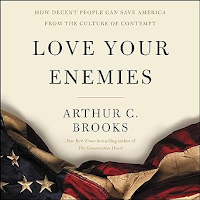
Love Your Enemies**** by Arthur C. Brooks: Brooks addresses the atmosphere and relationships in our time and says we have fallen into a "culture of contempt." He distinguishes this from anger and other negative emotions that we might think are the root of the problem. Contempt implies that we think very ill of those who believe differently from us, don't respect their opinions, and are convinced they have been brainwashed, etc. This has happened to me at the hands of one of my own relatives and it's deeply unpleasant--my relative will go to the grave calling me brainwashed because they refuse to have an intelligent conversation about our differences of opinion. The author is droll at times, which I enjoyed, and he has well-explained solutions on how to purge contempt from your own life, and help others to as well. A must-read book, read it now!
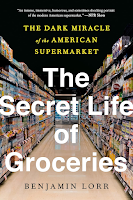
The Secret Life of Groceries***1/2 by Benjamin Lorr: The subtitle for the book is "The Dark Miracle of the American Supermarket." When we were raising our kids we spent time and effort picking our own fruit and vegetables and then canning, drying and freezing them. Among the reasons for doing so was that our kids learn that food doesn't grow on a grocery store shelf. And this author goes deep into that thought.
He touches on a variety of aspects of grocery store life--what it is like to work in one, how a product ends up on the shelf, the marketing aspect, and etc.
The Situation Room***** by George Stephanopolous: A must read--it's not long and it's gripping. Author goes through the history of "the sit room" over the past 60 years. He focuses on the political actions during well-known events such as the Vietnam War, Reagan's assassination attempt, 9/11, etc. Also described are how each president used the sit room, and how crises were handled. I loved this book partly because he shed light on the inner workings of the White House, and on little known facts about events I have lived through, and on personalities of American presidents. Highly recommend.

Wuhan Diary**1/2 by Fang Fang: It should be fascinating to hear a personal story of what went on in Wuhan China during Covid. I found it rather dull. Author lived through the lockdown and had much to say about that, but she spent a lot of time on other things such as how she was reviled in social media, etc. The book covered only the lockdown period and did not continue through the end of the Covid pandemic.
The Final Witness**** by Paul Landis: Landis witnessed the JFK assassination from just feet away, and it haunted him until even now. He was a Secret Service agent riding on the car following the president's when it happened. This book is his personal account of events of that day. He leads into it by detailing his life, and how he was eventually assigned to the role that put him where he would witnessed one of the heinous events in American history. Though I was barely 9 years old in late 1963, I remember the day well.
The Picnic**** by Matthew Longo: I love this book. It details the lesser-known events leading up to the fall of the Berlin Wall. I remember well the progression in the summer of 1989 that seemed to begin with Hungary opening its borders to East Germans, and that culminated in the blessed event of November 9--the fall of the Berlin Wall. There was much more going on than I knew. Author relies on personal experiences of ordinary people.

The Dreamt Land***** by Mark Arax: Growing up in a tract house in Southern CA surrounded by crop-land and horse ranches, this is one of many eye-opening books that helped me see the incongruity of it all. Much of California is an arid desert, and yet it is also the breadbasket of America. Almonds, lemons, oranges, raisins, wheat, pistacios, rice, pears, plums, apples, grapes, avocados, cotton, and dozens of other water-sucking crops fill the landscape. Water rights have always been a source of contention in the West, and history shows us steal after steal after steal of water by powerful land magnates and major municipalities in California.
This book focuses on the Central Valley (San Joaquin Valley), and takes hard looks at where water is coming from and where it is going and to whom it is going. And from whom it is being "stolen." Growers are the bad guys here, and they seemed not to care about anything but gaining enough water to grow whatever they want and lots of it. Almost no thought has been given over the last 150 years to what happens when a river, creek, slough or delta loses its water to the growers.
What about the consumer? The book doesn't focus on the millions who depend upon what the growers produce. Thought may be changing as to which crops and how much should be grown. Would you as a consumer be willing to pay twice as much for almonds or grapes if the size of orchards and cropland was reduced to a more reasonable number of acres? Controlled production would hit our pocketbooks big time. Something to think about.
I loved this book. It is well-written and addresses a serious issue that needs to be recognized, and not only by those in Central Valley. California produce ships to every state, and around the world.


An Analysis of Jane Jacobs's The Death and Life of Great American Cities by Martin Fuller: What went wrong in the development of cities in the US? The author addresses Jacobs's thoughts on diversity, livability, transportation, safety, and what does and doesn't work in making American cities pleasant to inhabit. Priority is people, not cars. Even though it was written in the early 60s, her book is amazingly pertinent to today. I have definite opinions on how roads and communities should be built to maximize positive impact on people who live there. The antithesis of that is when development takes the course of "it has always been done this way," or "we must prioritize traffic flow." I spent about 15 months on a local ad hoc committee to improve transportation in our area. We had several notable, important successes, and now 15 years later I can see that it wasn't enough. We still have roads and developments that are hostile to those who live here.
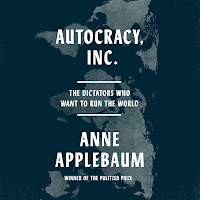
Autocracy Inc.**** by Anne Applebaum: Autocracy has gone global. These systems connive together to "prove" that democracies are evil, they don't work, and there are better systems out there. With the webs they weave around this theme, they are able to deceive other peoples and governments, and individuals living in democracies. I have actually heard Americans say, "Democracy doesn't work." And sometimes they add "Just look at how bad our lives are under this system. Groceries cost too much, people can't make a living wage, our rights are taken away because we have to wear masks" etc. etc. If they only knew. They forget that we have groceries on the shelf and we aren't carted off to jail if we express dissatisfaction with our government.
The desire for power and wealth can be fulfilled by those who are ruthlessly skilled in deception and have the charisma to persuade unthinking citizens to fall in line with them.
Dereliction of Duty**** by H.R. McMaster: This is an analysis of how the US became trapped in the Vietnam War. It's good that someone wrote a detailed well-documented book about the goings on that were not generally or publicly known at the time. The lies and the deceptions are disarming. The American people deserve(d) better.
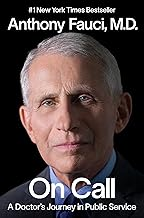
On Call**** by Anthony Fauci MD: This is Dr. Fauci's memoire and I enjoyed it because I admire him for his life-long work in fighting infectious diseases, and the dignity he showed when under fire by largely-ignorant people in 2020-2024. He chronicles his early life, and early married life, and makes them sound ideal, even to the point of having time for leisurely family dinners and fun activities when he and his wife were both working full-time (and more than full-time at times) and she was also a fuil-time PhD student. But ok. The rest of the book details his medical career, and much of the book focuses on his fight against HIV/Aids. i was moved by his deep dedication to the victims of this horrid disease. He covers Ebola, SARS, MERS and other diseases and I found it quite interesting to know how fighting diseases works out on the world stage.
Most interesting to me is the part about Covid. Fauci was the face of the fight against it. He was blamed for so much, including making a big deal out of nothing, flip-flopping on mask-wearing, closing down schools and public events, etc. Truth is, he, like every other scientist, didn't know everything about the disease on day one.
Once Covid became a political issue, it got even worse. He and his family, even his kids, were the target of awful expletive-laced anonymous phone calls and death threats. Even at the time, I thought it weird that his detractors expected him to know every single thing about Covid from the beginning. And, Fauci is not a politician, does not hold political office, and so is not in a position to shut down the country. That was Trump and his crew, and then the governors in each state.

Hillbilly Elegy***1/2 by J.D. Vance: I'm not a Vance fan, period. I strive to broaden my horizons, and this book did. The stereotypes about "hill people" are at least partly true in Vance's family. Instability, revolving relationships, under-employment, drug use, violence, and other self-destructive behaviors plague this slice of society in his native areas of Ohio and Kentucky. Vance doesn't seem to shy away from admitting his family's flaws. The miracle to him is that he and his sister escaped the terrible cycle and lead good lives, and he attributes that to the support system of decent extended family who stepped in to keep him from being lost. He does blame some government policies that don't understand the traps that the poor are in, and thus make situations worse.
The Four Tendencies**** by Gretchen Rubin: This was a book-group read, otherwise I wouldn't have picked it up. BTW, my book group was started in 1983 by a marvelous group of empty-nester-age women, all of whom are now gone. I didn't join until the early 2000s, and we have soldiered on, meeting 5x a year (every other month except July).
Anyway, I liked the book. Author has created four tendencies: Upholder, Questioner, Obliger, Rebel, which describe human personalities. Then she goes into detail on how each type of person (and of course there are cross-overs and blends) looks at life, and how the rest of us can learn to see life the way another's life sees it.
It's a great theory and can help a person like me to appreciate my husband's and kids' various ways of seeing and doing. For example, my husband is clearly a Questioner. Sometimes I"m embarrassed by how long and deep his questions are, say at the doctor's office. What seems obvious to me is not to him, or you could say, he needs to hear answers from the source, and not just assume something. I myself am an Obliger, which certainly many mothers have to be. Everyone else's needs and schedule come before my own--or at least they did when the kids were at home. I've broken the mold somewhat, which is good. If I want to go for a walk on a beautiful afternoon at 5:00, I tell the others in my house that I'm not cooking, they can root around for something to eat.
I recommend the book because it's good for all of us to understand how the next person thinks.
Reader, Come Home***1/2 by Maryanne Wolf: This is a complex book on some levels. Or maybe I just don't have enough background in the process of what reading is, and how it happens. I just read. The author is concerned about today's children going through the "deep reading" process, if I have worded it right. Children are bombarded with distractions and interruptions, and have many choices of activities. They may never learn to soak up syntax or understand thinking processes. And what about those with disabilities that make reading difficult in the best of circumstances. She advocates that at a young age--no later than grade 3, say-- children who need help must be identified. To leave that until later serves no one. The book provides much for thought.
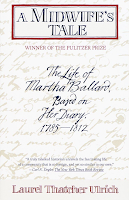
A Midwife's Tale by Laurel Thatcher Ulrich: This book goes with Frozen Snow which I've reviewed in the fiction section below. A Midwife's Tale is a presentation of Martha Ballard's actual diary from which the fiction book was created. Even though many of her diary entries are coded or terse, Ulrich is able to fill in the culture and practices of the time, and historical events (local and general) in order to give context to the diary. First person accounts such as this flesh out what society was really like at a given time. And this one being by a female gets down to the nitty gritty of daily life.
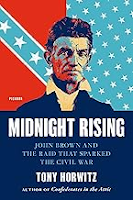
Midnight Rising**** by Tony Horowitz: I wish Horowitz had not died. HIs books are good and this is one of several about the South. The abolitionist John Brown has been an enigma to me. I never have delved deep into his life, but this book does, and has helped me understand why Brown did what he did, and the profound effect that his failed raid on the US Armory had on the slavery question. Brown's "contribution" to promoting the abolition of slavery cannot be discounted or minimized.
--------------FICTION----------------
News of the World***** by Paulette Giles, second reading: I love this book. It great to listen to the audio because they chose the perfect narrator, Grover Gardner, who has narrated other books I have enjoyed. An elderly man makes his living in 1870 wild Texas by traveling from town to town to read newspapers aloud to all who would pay a dime to hear it. He is approached by an acquaintance to please accept the task of a returning a 10-year-old white girl, who was a Kiowa captive for four years, to her family. That is, to her extended family, as her own was murdered in the raid that made her a captive. And so he sets off on a hundreds-of-miles journey to Castroville, Texas. The "unbroken" girl tests his mettle every step of the way, at first anyway. As they travel, the book conveys the landscape, the personalities they meet along the way, the confrontations with vagabonds and settlers in a vast, unsettled, unruled landscape.
The movie made from this book, which stars Tom Hanks, is also excellent.
The Winter Soldier***1/2 by Daniel Mason: Loved this book. The setting is World War 1, yet it's different from most WW1 stories in that it takes place on the Eastern Front in what is now Poland and Hungary. Because half my ancestry comes from Eastern Europe, and I have heard of some of the places, I was intrigued.
Chenneville**** by Paulette Giles: The same narrator as in News of the World, an excellent choice. He has a gravelly countrified voice that matches the setting and mood of other books set in rural areas in the 19th century, perfect for narrating an odyssey through the South after the Civil War......Excellent!A badly wounded Union soldier makes it home only to find a distressing situation at there. Due to lack of manpower crops have not been harvested, everything is in disrepair, and then he finds out about the murder of some family members months previous. He sets off on a journey to find and punish the perpetrator. He meets interesting people along the way.
My Father's House*** by Joseph O'Connor: Rome 1943. The Nazis are in control, people are afraid, people are starving. People who can are fleeing into neutral Vatican City. Father Hugh O'Flaherty makes his mission to find and bring into the city people whose lives otherwise might be forfeit--Allied POWs, Jews and others. Good book.
The Heaven and Earth Grocery Store**** by James McBride: Pottstown Pennsylvania about 1930. Jews and Blacks lived apart from the rest of town, and sort of supported each other in their various endeavors, as they were both not part of the White Christian world that occupied the better part of town. The author did a good job of weaving normal struggling lives together in a realistic way. Both groups connived to protect a young Black boy from being taken to an institution by the State, and that plot is at the center of the book. Excellent story.

Happiness Falls**** by Angie Kim: A father of 3 disappears in the local park one day, and mystery surrounds the situation. That's the backdrop. The book is really about the family dynamics which are complicated because the youngest child was born with Angleman's Syndrome. Eugene cannot speak, or even express himself very much. The family loves him and looks after him. What they don't know, and don't find out until Dad goes missing, is that Dad has found an intriguing way to help Eugene. I was riveted. The down side of the book, and this is just me, is there are far too many F words in here, probably because the author thought it would be clever to have the daughter seem witty by speaking this way. It's stupid and usually I would just put a book like this down soon as I spotted the pattern. I mean, if an author had a character constantly saying something inane like "bananas" constantly, I would put that one down too. But there are few books written where a disabled person is a strong part of the plot. And being a parent and grandparent of a disabled child, it was worth it to me to forge ahead.

The Lost Bookshop*** by Evie Woods: An intriguing story about a number of people whose lives become woven together with the connecting thread being a bookshop lost to time. The time line runs from the 1920s until now. It's an intriguing story that involves strange happenings, such as books that find their way off the shelves, and a person who is eventually seen as imaginary, but who helps a young woman "find herself." The story is a little woo-woo, but I liked it.
The negative of the story is that I did not get the feeling of time passing. I couldn't tell how long it was between one event and the next. A day, a week, a month? There were no hints such as, "she trod through the snow," or "she ducked under an awning to escape the unbearable rays of the sun," etc.
The Women**** by Kristin Hannah: I was prepared to not like this book as so often I'm disappointed by modern fiction. But I couldn't put it down in the first half, and was still interested as it progressed. A young woman (Frankie) of wealth and status decides that tea parties, ball gowns and such are not for her. She got her RN degree, then enlisted in the Army as a nurse during the Vietnam War. Her brother had been killed there, and she wanted to make her place in service, so her picture could be hung on her father's "hero wall" in his study. The descriptions of the war, the medical treatment, the danger, the exhaustion and frustration is very real.
Frankie comes home unappreciated, or even reviled by family and the American public. Her father was ashamed of her choice and had told everyone she was away studying in Florence Italy, so. She suffers from what we now know as PTSD. It's painful to witness, and at times I just wanted her to see that alcohol and pills are not helpful. I know that, why couldn't she?
There are aspects of the book that are less believable. A number of times her two closest nursing friends hop on airplanes and show up to help. Nice, but not practical. I remember what a big deal it was to fly on a plane in 1970, and people did not do this often or casually.
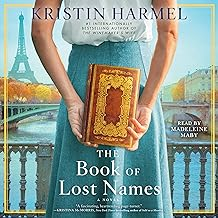
The Book of Lost Names*** by Kristin Harmel: A young 20s Jewish woman is caught with her parents in the drama of World War 2 France. She finds her way by working for the French Resistance as a forger of documents. The book also focuses on the present, her life as an old woman with tragic memories. The plot is great, and was enough to keep me engaged. The writing could be better. There are too many of those hanging phrases that living, in-the-flesh people don't really use. You know, the 2 or 3 words followed by silence that doesn't always get filled in: "you mean . . .??", "is it . . . . .??" "is he . . . .??" "what about . . . .??" "how . . . .??" The other negative in the book is that the main character comes across as a bit dense at times. Too many things have to be explained to her and it gets annoying.

The Better Angels of Our Nature** 1/2 by S.C. Gylanders: A mysterious young soldier shows up at General Sherman's headquarters on the even of Shiloh, mysterious because he seems to know a lot about everything, and insists on serving the General even when he is rebuffed by him. Something is other-worldly about the boy, and the ending is just sort of ho-hum. It was a page-turner for a while, but it's about a third longer than it needed to be and by that last third I lost interest.
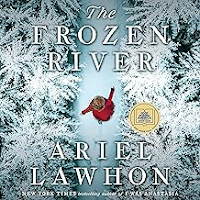
The Frozen River**** by Ariel Lawhon: A Maine midwife in the late 1700s becomes involved in village controversies which concern rape and murder. I liked this book a lot--the setting, the characters, the story. The protagonist is Martha Ballard, an actual midwife who lived in the time period of the novel. She faces heartaches and challenges, and at times has to face down greedy, lying men who have zero respect for women in general and for her in particular. Recommend. (NOTE: this novel is based on A Midwife's Tale)













































